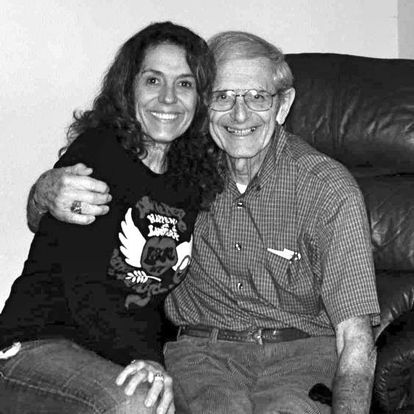
I’ve written things I didn’t want to write, pieces I regret ever seeing the light of day, and countless stories, essays, blog posts, and a few memoirs that may never be finished. Some pages come easily; others are slogs, but I stay with it if I feel like something’s there. A few days ago, I was given the difficult task and deep honor of writing my Dad’s obituary. I was honored my family gave me the responsibility of writing it, but I also struggled. Not because I couldn’t find the words or the stories but because I didn’t want to write in past tense. It was also hard to edit my words to an appropriate-sized piece as I wanted to include far more than would fit into the parameters of an obituary. I called the Kansas City Star to ask them what the average length of an obituary was and was told there was no limit. She told me they had seen a few at 900 words, which was rare, and if I had a lot to say, 800 words was a good number. As we spoke, I looked down at my word count. 982. OK, I told her I’m good. Inhale, exhale, and start deleting.
I settled into a table at the back of a cafe with a big cup of coffee and my computer and started typing. I was only a few sentences in when I realized that typing in a public place had not been a good idea, as I was only a few sentences in when I began to sob. If anyone around me knew what I was typing, I’m sure they would have stopped staring and sent over some tissues. After an hour or so, or about a large cup of coffee later, I finished editing, cutting a few hundred words in the process. The cutting felt painful because who am I to decide what is put in and what is left out when it comes to such a public reckoning of who my Dad was and what he did in his life? Dad was a storyteller. He would have also struggled with the assignment. I felt proud and sad at the same time and made a promise to myself that it wouldn’t be the last time I wrote a piece about my Dad. I was also sad, because Dad was one of my favorite readers, always with a comment, and this would be one piece he would never read.
Dad was blessed with 96 years, and up until two months ago when he fell, most of those 96 years had been good, with Dad holding onto his attitude of “today is going to be my best day yet,” regardless of what he had on the calendar.
I left the cafe with the kind of headache you get after crying, a pain that is felt more emotionally than physically. I got into my car, called my sons who happened to be in town and told them I was on my way to meet them for lunch, then I backed into a truck who was entering the parking lot. I’m a good driver and can count on one hand how many wrecks I’ve been in with a couple of fingers left over, none of them serious. All I could think of was, seriously? This is how I’m ending my morning? The couple exited the truck, and the man said, “Oh great, I see you don’t even live here… Colorado?” “Yes, I do, but I’m here for a while because”… I considered my next sentence as it felt manipulative, but I said it anyway… “My Dad passed last week, and I’ll be in town for a while.” The woman sighed and told me how sorry she was. The man went back to his truck in search of paper. Both of our vehicles were damaged, his worse than mine, but both were drivable. We exchanged information, and I got back into my car and cried because I wasn’t sure what else to do, then started laughing because seriously, had I shared with the couple that I had been in the cafe writing his obituary…well, you can’t make this stuff up and it sounded like I just did.
The events of the morning would have been a great story to share with Dad. After hearing it, he would have ensured that I was OK and the person I hit was OK, then would have found the humor in the situation along with the irony. He was good at that. Had he been in a similar situation, he would have chatted with the other driver and likely shared a story, ending with a handshake and a laugh. You were the storyteller, Pops, and I was honored to be given the gift to tell yours.
Bob was often called a Renaissance man, “a fully-rounded person, knowledgeable in many areas, including the sciences, arts, and humanities.” To that, his family would add that he was the one who got the call when the car wouldn’t start, the disposal was jammed, or help was needed to get an oversized mattress down a narrow flight of stairs. Dad was the first call when a trusted Volkswagen was no longer trusted and needed a tow. He improvised with his equipment more than once by taking his belt out of the loops and using it as the tow rope. Dad was always available and ready to roll up his sleeves and go to work whenever his family needed him. This philosophy was also how he spent 28 years working Monday through Friday at Olathe High School, where he was a guidance counselor with an open-door policy to anyone who needed advice, encouragement, counsel, or simply someone to talk to.
Bob was born in Pleasant Hill, Missouri, on August 1, 1928. He died on September 7, at Foxwood Springs in Raymore, Missouri, where he and his wife Nancy had lived for the past13years. When Bob graduated from high school, he joined the Army and was stationed in Pisa, Italy. His musical ability was recognized, and he was asked to form a band with the German prisoners of war. He didn’t speak German (or Italian), but he shared the language of music with his band, communicating with notes, not words.
He met his wife, Nancy, at Central Missouri State University in Warrensburg, Missouri. They were married after he graduated, and on August 29th, they celebrated their 71st anniversary. He had a special evening planned 71 years ago that would end with a marriage proposal, but he couldn’t wait. Bob pulled off the highway under a Miller High Life billboard and popped the question. Nancy said yes, and on every anniversary after, including this last one, he would tell anyone around that he still couldn’t believe she said yes.
Bob and Nancy had four children: Robin Blackman of Kansas City, Missouri (Jim Cumley), Laurie Sunderland of Boulder, Colorado, Susan Ketterman of South Egremont, Massachusetts (John Clarke), and Tom Blackman of Olathe (Renee Barta). They also have five grandchildren: Thomas Sunderland, Grant Sunderland, Emery Golson, Randi Jo Blackman, and Evan Blackman, as well as five great-grandchildren.
Bob was a curious man with many hobbies, most of them worked on in the garage, which never had a car parked inside. Instead, it became the headquarters for Bob’s many creations, which included everything from making furniture to carving intricate designs and figures to building a telescope that he spent countless hours working on in an unheated garage. His biggest project was building a sailboat. The maiden voyage was at a nearby lake, and before pushing the newly crafted boat into the water, he announced that he had no idea if the boat would float or sink. Thankfully, the boat didn’t sink and became another weekend hobby.
He taught his children, his students, and anyone who knew him the power of kindness and the beauty of living with a “glass half-full” attitude. At age 90, he connected with a few musicians at his retirement facility and formed a jazz band where he played the coronet. Playing music was one of his greatest passions, and even at age 96, he still played with strength and soul, never using sheet music, always by ear. His last concert was ten days before he died. His love of jazz began in high school when he would sneak out of his house and hitchhike to jazz clubs in Kansas City, where he was given opportunities to take the stage, eventually playing with the band The Scamps. Expressing himself through notes played on his horn was one of his greatest joys, and although they wouldn’t let him play his coronet in rehab, his mouthpiece was on the table next to his bed. One of the nurses said they weren’t crazy about him using the mouthpiece due to breathing issues, but they weren’t about to take it away from him as it gave him so much joy. Two days before his passing, when he was beginning to fade, a video was shared of him playing a solo during a recent concert. His eyes were closed, but he had a big smile on his face, and his foot began to mark time under the blankets. When asked if he knew who it was playing, he shook his head and said, “No, but he sure is good.” You got that right. You sure were good.
His kindness, his smile, and his “today is going to be my best day” attitude will be forever missed.

Such a beautiful and moving tribute to your father. Thank you for letting us see his essence. (P.S. Thank n my opinion, you share a striking resemblance to Joan Baez in the foto you included here .)
Thanks, Sarah and I’ll take the Joan Baez comment! I’ve not heard that before…